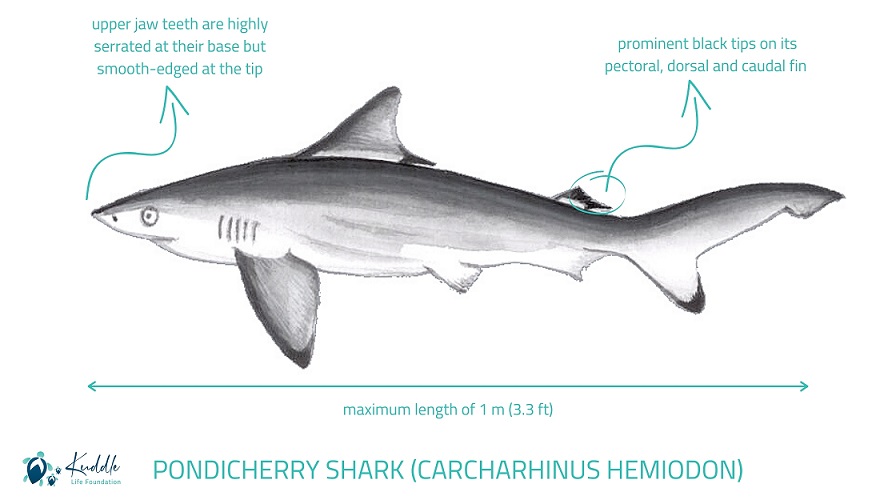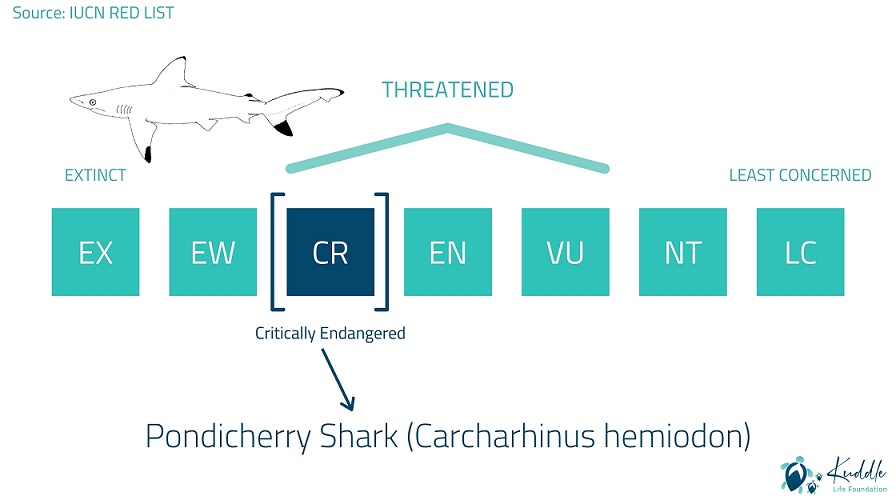Pondicherry Shark (Carcharhinus hemiodon) – An unfortunate subject of human exploitation!
The Pondicherry Shark or Carcharhinus hemiodon is a rare species of the requiem sharks. It is a small and stout grey shark which grows to a maximum length of 1 meter (3.3ft). Its upper and lower jaw consists of 12-15 tooth rows on either side. The species can be easily identified either by its upper jaw teeth which are highly serrated at the base but smooth-edged at the tip or by the prominent black tips on its pectoral, second dorsal and caudal fin.
Once upon a time, we could encounter Pondicherry sharks throughout the Indo-Pacific region, right from the Gulf of Oman to New Guinea. Sadly today, it is listed as critically endangered by the International Union for Conservation of Nature (IUCN).

How did the Pondicherry Shark get its name?
German biologists Johannes Müller and Jakob Henle furnished the first scientific description of the Pondicherry shark. The study was based on a 47 cm immature male shark from Pondicherry (Puducherry), India.
So is the Pondicherry Shark endangered or extinct? As there seems to be a debate!
According to the IUCN, the Pondicherry shark is critically endangered. The shark was believed to be extinct back in 1970 only until recently in 2019 when the famous Forrest Galante and his wife, zoologist Jessica Summerfield found it in a supermarket, in a village in southern Sri Lanka. However, there remains a debate over whether the shark they found was a Pondicherry shark or mistaken to be one.

What caused the Pondicherry Shark to be critically endangered?
The pondy shark is believed to be threatened due to the intense and escalating fishing pressure throughout its range. The shark was a regular catch around the coast of India and Pakistan but is rarely found today.
The Pondicherry shark & its habitat
Vastly distributed throughout the indo-pacific region, the Pondicherry shark was primarily found around the coast of India. A majority of the specimens of the Pondicherry shark are from India, and a few more were collected from Java, Borneo and Gulf of Oman. There are several old reports which claim that the Pondicherry shark even entered freshwater occasionally and was spotted in the rivers, Hooghli and Saigon. If the reports are accurate, then that could suggest the low salinity tolerance of the Pondicherry sharks.
Phylogenetic tree of the Pondicherry Shark
The evolutionary relationship of the pondy shark is still uncertain. Based on a morphological data study from 1988, the Pondicherry shark was grouped with the smalltail shark, blackspot shark, spottail shark, creek whaler, whitecheek shark, Borneo shark, and hardnose shark.
What was the Pondicherry shark’s food source?
The Pondicherry shark would commonly feed upon small bony fishes, cephalopods, and crustaceans.
Pondicherry Shark & Humans
The Pondicherry shark was harmless to humans. It was caught and used for its meat. Due to overfishing, the Pondicherry shark has completely vanished from the coast of Pondicherry.
Sharks maintain an intricate balance in the oceans. They are an apex predator which maintain the species below them in the food chain and serve as an indicator of ocean health. Without sharks, the weak and sick will not be removed from the ocean, and the species diversity of the ocean will be adversely affected.
Sharks feed on the larger predatory fish such as groupers, and without their absence, they stand to increase in abundance. With an increase in the population of larger predatory fish like the groupers, a coral reef system is depleted of herbivores fish life. With a lack of herbivores fishes, the population of microalgae expands, which directly results in their dominance and the end of a reef system.
What can we do to help the sharks?
Pondicherry shark is just one such example of the endangerment of the survival of a shark species due to human activity. A majority of the shark species today face the threat of extinction, and it is up to us to make a change and save our sharks.
Ways we can help the sharks –
- Learning everything about sharks
- Boycotting shark products
- Making sustainable seafood choices
- Volunteering at marine conservation NGOs
- Spreading awareness about the issues revolving sharks
- Donating for the cause
- Being aware and informed consumers
A little about us!
Kuddle Life Foundation is a marine conservation NGO based out of the beautiful coast of Pondicherry, India. We strive to be a platform for marine biologists and citizen scientists to research with the help of artificial reef programs and gain actionable insights to fight ocean pollution. Our primary programs include artificial reef, marine fish and mammal rescue, coastal pollution & waste management, and education & outreach. We aim to streamline marine conservation into the community. If you have any ideas or would love to contribute to the cause, then feel free to write to us. We are friendly like the dolphins and open to creative ideas to fight ocean pollution.

Your support matters!
Help us reach more people. Share this post with your friends!